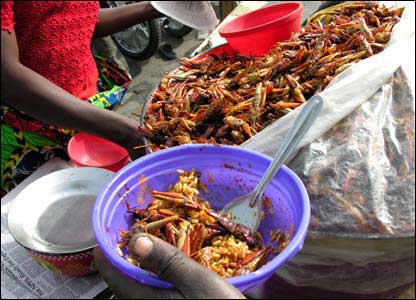Apart from creating jobs and bringing in much-needed cash, the United Nations Food and Agriculture Organisation says edible insects, such as locusts, can help to address food insecurity.
Most people view locusts as destructive and annoying pests but in Maiduguri, the capital of Borno State, these insects are a tasty and nutritious delicacy – as well as a profitable business option.
Catching, cooking and selling the crispy creatures is becoming big business.
And even the threat of insurgent attacks and kidnappings – and often coming face to face with wild animals, snakes and scorpions – has not stopped people from going into the bushes to collect their lucrative treasures.
The insects, which form part of the grasshopper species, are highly nutritious – they are rich in protein and their essential amino acid composition is good.
And it’s not just the residents of Maiduguri who generate an income from catching and selling the deep-fried delicious snacks, the practice is common in other parts of Borno State, as well as in the northern states of Katsina and Kaduna.
Baa Buji Kafima’s job is to catch locusts. He told RNI that he worked with five other men. Every day they go into the bushes to catch the lucrative insects. Then they go into the city to sell them.
“We wear boots and old gloves to catch the insects which we put in large sacks. Sometimes we catch them at night and use torches to provide light.
“It’s not an easy job. Some locust catchers have been attacked by insurgents while in the bushes. And we often come across snakes, scorpions and other dangerous wildlife. But the trade in locusts is growing and we make a good living by selling them in the city.”
Kafima said he sold one bag of raw, unprocessed locusts for at least ₦43,000.
Mohammed Mustapha, who also catches locusts to earn a living, said: “Sometimes we are unlucky and insurgents find us. They order us to catch other wild animals for them before they release us.
“At times they have kidnapped some locust catchers and held them for ransom. A while ago they kidnapped the family of one of the catchers. Since then we have stopped going too deep into the bushes and forests.”
It is mostly women who buy the raw locusts. They clean the locusts in hot water and flavour them with spices, including dried pepper, garlic powder and salt. Once seasoned, the locusts are left to dry in the sun and then they are deep-fried in vegetable oil. The women sell the delicious crispy snacks.
They say their business provides a stable income and that the demand for the lucrative delicacy is growing.
They are not only popular in Nigeria. Some sellers export them to England, America, Saudi Arabia and other African countries.
Farmers say a swarm of locusts can devastate crops in a an extremely short time and that is why they encourage their capture because it protects their farmlands from the destructive insects.
For the catchers – and the women who buy and sell the cooked insects – the locusts are not regarded as pests anymore because they have created jobs and, although seasonal, they bring in money for many cash-strapped Borno State citizens.
They also provide an affordable protein for families who are struggling to make ends meet during the prohibitive cost-of-living crisis.
Mohammed Kashim, a doctor, told RNI that locusts were highly nutritious.
“They are rich in proteins and help build the body. They can easily replace eggs, beans, meat and fish, which are extremely expensive.
“For younger people the locusts provide a healthy snack and are a good replacement because they are rich in nutrients. But elderly people need to be careful. They could accumulate an excess of uric acid, which results in joint pains, such as painful knees and backaches.
“The safest way to catch locusts is by using traps but some people use chemicals and insecticides that are dangerous to the health of humans.
“As a medical professional, I advise people to ensure they know the source of the locusts – where they were caught and if insecticides were used. If insecticides were used, I would tell people not to eat the locusts.”
The United Nations Food and Agriculture Organisation said edible insects, such as locusts, could help to address food insecurity and environmental concerns.
It said insects were highly nutritious because they were rich sources of fat, protein, vitamins, fibres and minerals.
It encouraged people to farm locusts, saying they emitted fewer greenhouse gases and less ammonia than cattle and other traditional livestock, and required less land and water.
AYSHA MUSTAPHA KOLOMI






